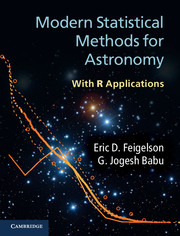Book contents
- Frontmatter
- Contents
- Preface
- 1 Introduction
- 2 Probability
- 3 Statistical inference
- 4 Probability distribution functions
- 5 Nonparametric statistics
- 6 Data smoothing: density estimation
- 7 Regression
- 8 Multivariate analysis
- 9 Clustering, classification and data mining
- 10 Nondetections: censored and truncated data
- 11 Time series analysis
- 12 Spatial point processes
- Appendix A Notation and acronyms
- Appendix B Getting started with R
- Appendix C Astronomical datasets
- References
- Subject index
- R and CRAN commands
- Plate section
Appendix C - Astronomical datasets
Published online by Cambridge University Press: 05 November 2012
- Frontmatter
- Contents
- Preface
- 1 Introduction
- 2 Probability
- 3 Statistical inference
- 4 Probability distribution functions
- 5 Nonparametric statistics
- 6 Data smoothing: density estimation
- 7 Regression
- 8 Multivariate analysis
- 9 Clustering, classification and data mining
- 10 Nondetections: censored and truncated data
- 11 Time series analysis
- 12 Spatial point processes
- Appendix A Notation and acronyms
- Appendix B Getting started with R
- Appendix C Astronomical datasets
- References
- Subject index
- R and CRAN commands
- Plate section
Summary
As demonstrated throughout this volume, astronomical statistical problems are remarkably varied, and no single dataset can exemplify the range of methodological issues raised in modern research. Despite the range and challenges of astronomical data analysis, few astronomical datasets appear in statistical texts or studies. The Zurich (or Wolff) sunspot counts over ∼200 years showing the 11 year cycle of solar activity is most commonly seen (Section C.13).
We present 20 datasets in two classes drawn from contemporary research. Thirteen datasets are used for R applications in this volume; they are listed in Table C.1 and described in Sections C.1–C.13. The full datasets are available on-line at http://astrostatistics.psu.edu/MSMA formatted for immediate use in R. Six additional datasets that, as of this writing, are dynamically changing due to continuing observations are listed in Table C.2 and described in Sections C.14–C.19. Most of these are time series of variable phenomena in the sky.
Tables C.1–C.2 provide a brief title and summary of statistical issues treated in each dataset. Here Nd is the number of datasets, n is the number of datapoints, and p is the dimensionality. In the sections below, for each dataset we introduce the scientific issues, describe and tabulate a portion of the dataset, and outline appropriate statistical exercises.
The datasets presented here can be used for classroom exercises involving a wide range of statistical analyses. Some problems are straightforward, others are challenging but within the scope of R and CRAN, and yet others await advances in astrostatistical methodology and can be used for research purposes.
Information
- Type
- Chapter
- Information
- Modern Statistical Methods for AstronomyWith R Applications, pp. 399 - 433Publisher: Cambridge University PressPrint publication year: 2012
